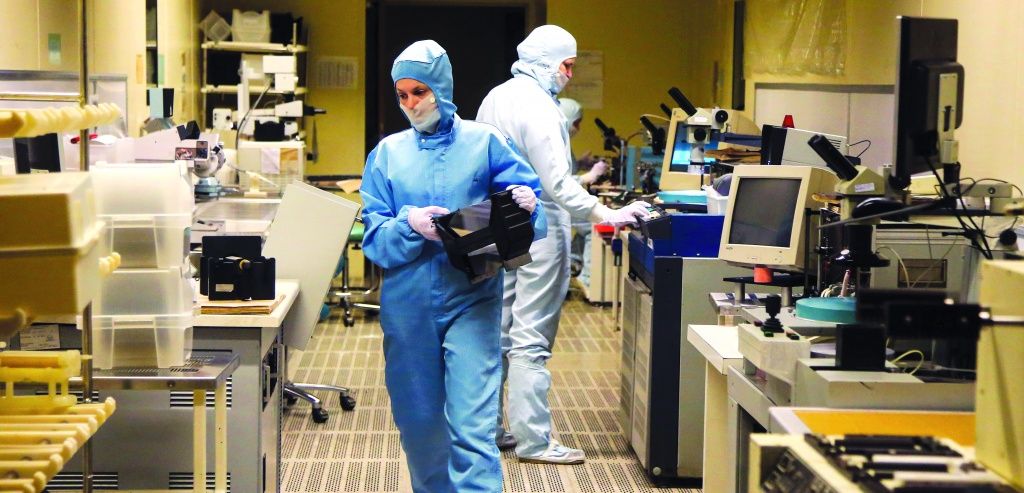The economies of Belarus and Russia are experiencing hard times, obliging production volumes to be reduced and shorter shifts to be introduced for employees. Against this background, Minsk’s Integral JSC is demonstrating stable results and confidence in the future. One of the Union State’s leading microelectronics plants, it boasts an almost complete portfolio of orders, operating three shifts five days a week: even sometimes working at weekends. Some customers are obliged to wait for their orders, making payments in advance.

The plant’s success is evident, as Integral’s Deputy General Director for Marketing and Sales, Alexander Dudkin, underlines. He believes that his enterprises’ success is founded in the sci-tech programmes which have been financed by the Union State budget, and in which his enterprise has taken part several times, each project running for 3-4 years.
These considerable investments into new developments and technologies are allowing demand to be met for domestic micro-electronics: a clear goal of Belarusian and Russian leaders, to ensure the technological security of the Union State. Until recently, around 75 percent of the micro-electronics market was served by foreign supplies: an alarming trend. Since Russia and Belarus boast a history of producing rocket and nuclear weapons, and nuclear energy, and have a well-developed space industry, it makes no sense to be reliant on imported electronic components. Union State programmes aim to resolve the situation, supporting co-operation between Belarusian and Russian companies and scientific-research institutions. As a result, Mr. Dudkin believes that Integral’s exports to Russia are likely to rise by around 30 percent in 2015.
Integral is a pioneer in developing Union State sci-tech programmes. Corresponding member of Belarus’ National Academy of Sciences Anatoly Belous, the Deputy Director of the Belmicrosystems Sci-Tech Centre (a branch of the company), explains, “Among the first Union State programmes were Baza (with 50 new microcircuits developed), and Osnova (developing microcircuits and highly-accurate devices for the space and nuclear industries). Both programmes were successfully realised, leading to over 80 Russian enterprises using our micro-devices.”
The Osnova (Foundation) Union State programme was fulfilled between 2010 and 2013, involving around 40 Belarusian and Russian partners. Their joint work resulted in several years of planning for new production. Belarus alone developed and mastered batch production of 62 new types of microcircuit, eight types of transistor and 16 types of stabiliser. The Russians have also demonstrated progress: using Belarusian components, they are producing high-tech devices and mechanisms. Importantly, their products are now durable under the most extreme conditions, able to remain functional for years, despite temperature and pressure fluctuations, and under the influence of space radiation. Microelectronic devices based on Osnova developments are being applied at over 80 enterprises across Russia, Belarus and other CIS states.
The Soyuzny Teplovizor sci-tech programme aims to develop and master production of new generation thermal cameras, for application across various spheres, including engineering. Russian and Belarusian radio-electronic companies are already placing orders (for fulfilment through until 2017), confirming the need for integral microcircuits and semiconductor devices. These high-tech products will be used to manufacture over 120 new calculating and radio-electronic systems, with diverse application — including for the spheres of nuclear energy and space-research.
Many Belarusian and Russian electronic engineers’ developments are truly unique, as confirmed by applications to register new technologies in Belarus and Russia. Over 40 registration certificates have been received for chip layouts, although only seven or eight enterprises exist within the former Soviet Union producing microcircuits and similar devices for modern electronic products. Among them is Minsk’s Integral: the only company to have preserved a complete technological line. It is investing into the future, developing new electronic micro-devices, materials and technologies, producing thousands of electronic elements. These are finding customers in dozens of countries, being used within watches, calculators, white goods and, even, spacecraft. Not long ago, Integral won a tender to supply electronic microcircuits to India’s National Space Agency, chosen above rivals from the USA and other highly developed states.
Integral’s produce is especially popular in Russia, which purchases over 80 percent of its manufactures. Very few Russian planes and spacecraft fail to use them, and the same is true of automated systems at nuclear power stations and other top-level sites. Moreover, Belarusian enterprises are gaining a great share of the Russian market: in 2014, exports sales rose by 6 percent, with volumes rising even further.
After the USSR’s collapse, previously strong enterprises across the Soviet Union were left in a dire state, losing the economic ties established over decades, for both supply of components and sales markets. No money was available for technical modernisation and, importantly, qualified staff were lost, as salaries fell. Integral is very much focused on raising employee qualifications, and is fortunate in attracting alumni from the most prestigious Belarusian universities. Its salaries match the average in Minsk, while leading specialists earn even more.
Belarus and Russian have already agreed a new Union State programme involving Integral: Technology-SG. Mr. Belous informs us that three more Union State programmes are planned involving Belarusian electronic engineers. Naturally, microelectronics enterprises need to keep up to date, to maintain competitiveness.
Uniting Belarusian and Russian enterprises’ scientific and production potential should strengthen co-operation. One possible union includes Belarusian Integral and Russian Roselektronika: being one of five pilot integration industrial projects developed by our Union State over the past few years. Mr. Dudkin believes the idea remains topical, saying, “Concentrating material, intellectual and financial resources is beneficial for the Union State. We’ll settle all issues with our Russian colleagues at the proper level. An authoritative consulting agency has already assessed the enterprises, so it’s time for our two states’ governments to act.”
By Vladimir Yakovlev











